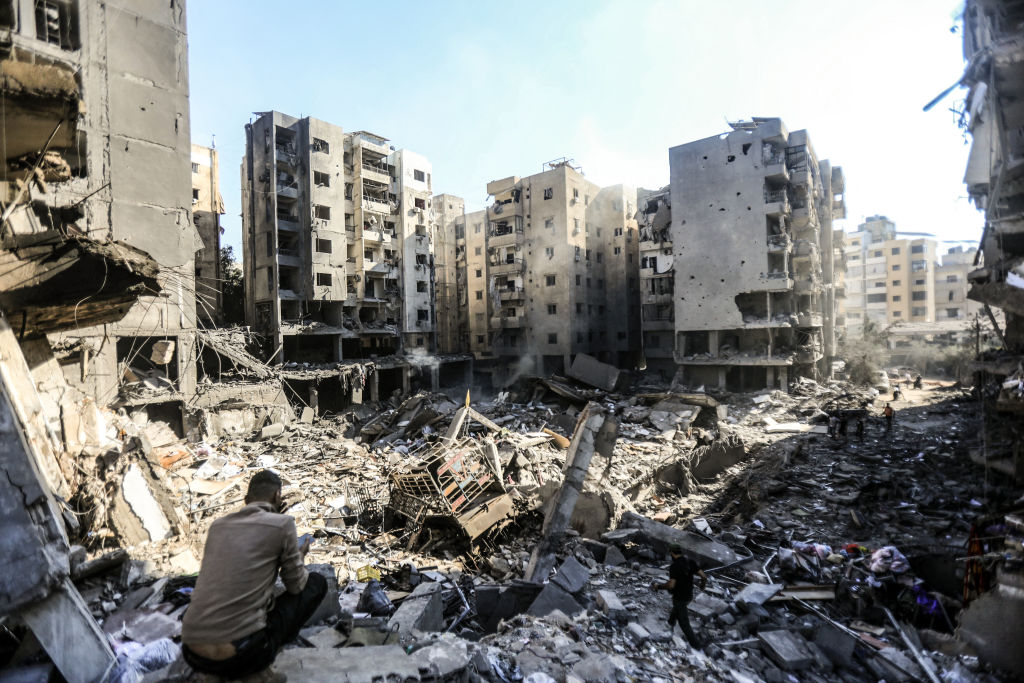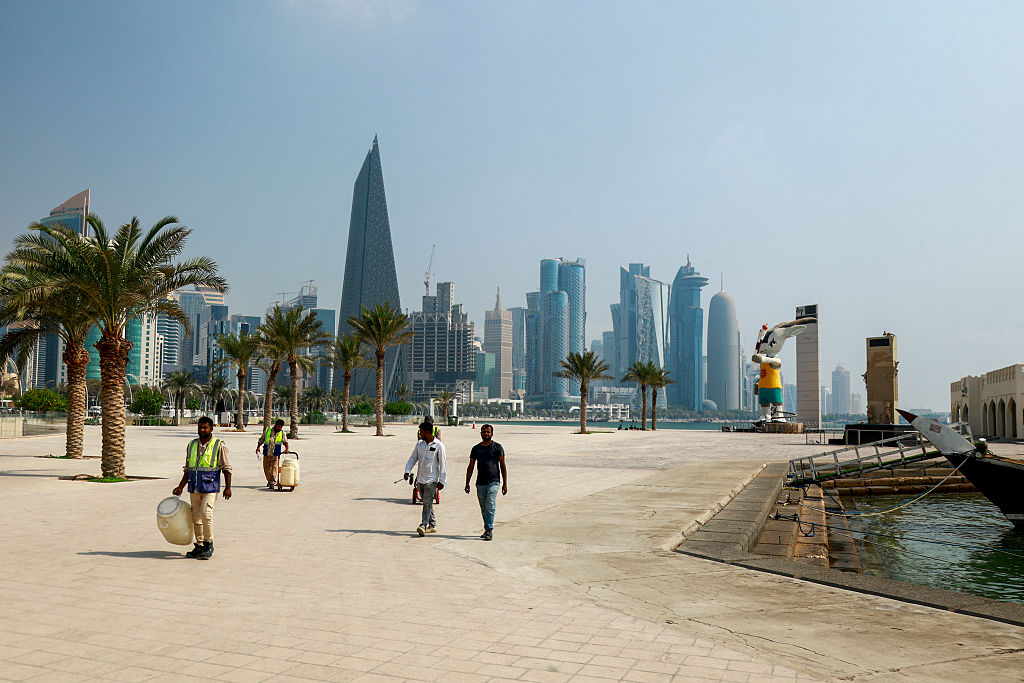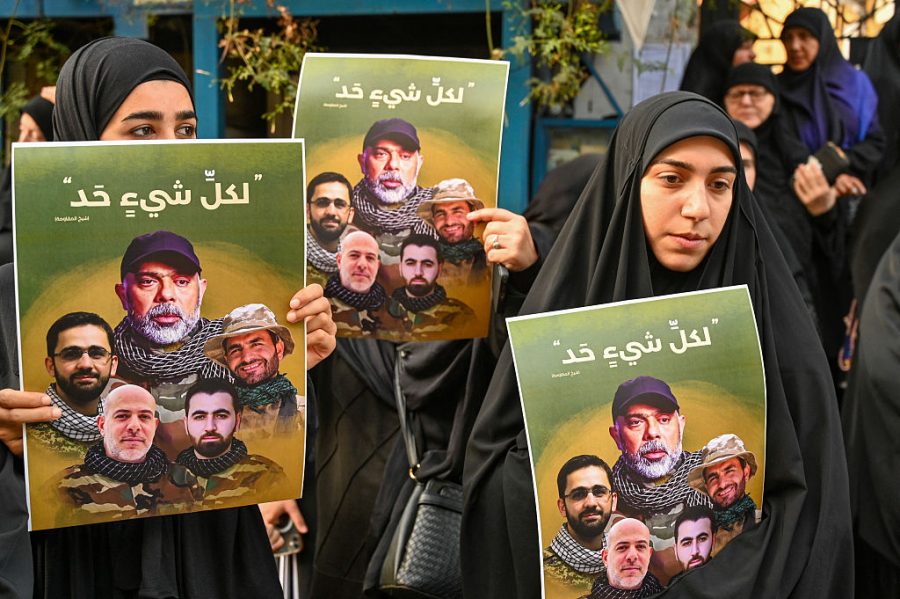The killing of Hassan Nazrallah is the latest — and most impressive — stage in Israel’s campaign to wipe out Iran’s terrorist proxies on its doorstep. From the Egyptian border to Beirut, the campaign is the most dazzling demonstration of real-time intelligence, high technology and precise military action in the modern era. It will be recounted on screen and studied by military experts for decades to come. James Bond’s gadgets had nothing on the booby-trapped pagers. As the meme put it, “From the liver to the knee.”
The battle started a year ago, when Hamas terrorists in Gaza broke the ceasefire, raped and killed innocent Israelis and took hundreds of hostages for negotiating leverage. It was obvious from the outset that Israel would respond with full force.
What was unclear, at least initially, was how far that “full force” would stretch. Hezbollah itself provided the answer when the Iranian proxy in Lebanon immediately made common cause with Hamas and began firing rockets into Israel. That was a deliberate choice, endorsed by Iran, and has continued for over a year. Hezbollah did not have to begin a relentless barrage, forcing some 60-70,000 Jews, Muslims and Druze to evacuate northern Israel for their safety.
Hezbollah’s goal was both to punish the Jewish state and force it to divert resources from the battle in Gaza. Israel responded by firing tit-for-tat rockets into Hezbollah strongholds while maintaining its focus on Hamas and Gaza.
But that was only a temporary, tactical response. We now see that Israel made a more fundamental strategic choice: it would have to eliminate Hezbollah’s capacity to attack Israel and make a section of northern Israel uninhabitable.
The basic decision, prompted by the twin attacks by Hamas and Hezbollah, was that the Jewish state could not survive in relative peace with Islamic terror groups on its northern and southern flanks, determined to keep killing Jews on a regular basis and, if possible, extinguish the Jewish state and all the Jews who lived there.
The mammoth blast that killed Hassan Nasrallah, head of Hezbollah, reflects Israel’s larger strategic decision.
Important as that decapitation is, it still leaves four major questions unanswered:
- Who will govern Gaza after the last Hamas fighters there are killed? Can anyone govern it?
- Will Israel conduct a ground invasion in southern Lebanon to clear out Hezbollah’s store of missiles and its hiding places in deep tunnels? The fear is that leaving them will only invite future attacks
- How can Israel ensure that terrorist forces, sponsored by Iran, do not return to Israel’s northern border or reform in Gaza?
- What will Iran do to avenge its beleaguered proxies? It will have to do something, but will it be more than a perfunctory gesture. The larger question is whether Israel will act to stop Iran’s effort to build nuclear bombs and missile delivery systems. Jerusalem is well aware that Washington will not act militarily
All these questions have profound implications for the United States and Europe. But note how they have been sidelined in the current conflict. Israel did not ask anyone’s permission to defend itself. Why bother? The Europeans have been feckless and are now overwhelmed by immigrants from the Middle East and North Africa. If they can’t save their own countries, how can they be expected to save Israel?
The Biden-Harris administration has always said Israel could defend itself. But that’s an abstract commitment — and it has been accompanied by criticism of many specific Israeli actions. The US has provided some arms and financial support, but it has restricted the use of those arms and spent months striving, fruitlessly, for a compromise deal with Hamas.
No compromise was ever possible. Why? Because Israel and Hamas have fundamentally incompatible goals. Israel is determined to wipe out Hamas as a military force, stop them from rearming, prevent them from governing Gaza again and make sure they could not stop others from governing there.
Hamas’s goal was opposed to each of these goals. It wants to rebuild its military and continue governing Gaza, not back away with a face-saving compromise. Its immediate military strategy was to hide in tunnels, embedded among civilians, using their fellow Gazans as civilian shields against Israeli attacks.
No matter how precise Israel targeted Hamas fighters, its bombs and artillery were bound to kill some innocents. After all, Hamas was hiding among them. These innocent deaths would inevitably fuel political resistance from European leaders, American progressives, fashionable Ivy League students, Muslim voters in Michigan and, of course, the Biden-Harris administration. That’s exactly what has happened, coupled with some outright support for terror among Muslim extremists and some on the far left.
But that’s only half the story. The other half is that Israel has ignored these external pressures and pushed ahead to eliminate the Islamic terrorists on its borders. They had to do so in sequence, first in Gaza, a task that is now nearly complete, and now in southern Lebanon.
The democracies in Europe and North America kept singing their feckless tune, “All we are saying is give peace a chance.” The problem is that the Gaza-Israel border was peaceful on October 6 — and that wasn’t enough for Hamas.
Nor was it enough for Hezbollah, the Iranian proxy based in Lebanon. They made a fundamental decision, supported by Iran, to back Hamas with their own rockets. They have a huge arsenal, all provided by the mullahs in Tehran, and began firing them into Israel to supplement Hamas and distract Israel from devoting all its energy to the war in Gaza.
Israel’s response to Hezbollah was to defend against incoming rockets and fire some of its own in response. But it did not want to go further while the fighting in Gaza was hot. What we see now is that the fighting in Gaza has cooled; Israel is mopping up there; and it has turned to deal with the lethal problem on its northern border.
In Gaza itself, Israel took almost a year to completely eliminate Hamas as a military force, though not as a source of political resistance. It has cornered the group’s leader, Yahya Sinwar, kept him scampering underground — and made it too dangerous to use his electronic communications, lest he be discovered. Israel will keep up the hunt until they kill him, as they have done with most of Hamas’s senior leadership.
Israel’s chief goal in Gaza is to crush Hamas, prevent it from rearming and allow other groups to take control of the rebuilding process there. If Hamas can reform or kill leaders from other groups, there is no chance to rebuild Gaza in ways that do not threaten the Jewish state. It is far from clear, however, how Israel (or the international community) can do that. The basic problem is that nobody wants to take responsibility for governing a Palestinian population, hell-bent on violent resistance and killing Jews.
To ensure Hamas cannot rearm and Iran cannot resupply weapons and technical assistance, Israel is determined to keep control of the Philadelphi Corridor, a thin barrier region between Gaza and Egypt.
There is a vile irony to that geographic term, since it means “Brotherly Love.” In this case, though, the love is between the Muslim Brotherhood, the major organization in Egypt and its offshoot in Gaza, Hamas.
What those loving brothers have done is dig dozens and dozens of smuggling tunnels from Egypt into Gaza to supply weapons, money and technical help to Hamas fighters. All of them run under the Philadelphi Corridor. The only way to block that terrorist aid, much of it from Iran, is for Israel to control the surface under which the tunnels run and slowly wipe them out. Egypt could have blocked their use and did so for a year or so after the el-Sisi regime replaced the Muslim Brotherhood (which had overthrown Mubarak), but then the Egyptians gave up. Their surrender left the job to Israel.
Hamas has said it would agree to a peace deal only if Israel relinquishes the Philadelphi Corridor and Sinwar is allowed to live (and thus continue his leadership). Neither is acceptable to any Israeli government.
Israel’s problem in Gaza now is easy to explain but nearly impossible to solve: can anyone govern the territory in ways that will limit its threat to Israel? That’s Israel’s only goal in Gaza, but it is non-negotiable.
What about Hezbollah and Lebanon? Israel’s non-negotiable goal there is to restore peace and security for its citizens in northern Israel, who have been subjected to a year of constant missile attacks. Some 60-70,000 Israelis have fled to safety, meaning the country has effectively lost sovereign control of its northern region. The immediate aim of the Netanyahu government is to make it safe for those citizens — Jewish, Arab and Druze — to return to their homes. That’s the whole point of the now-escalating attack on Hezbollah.
Why not strike an agreement, supervised by international monitors, for Hezbollah to leave its stronghold near the Israeli border and promise not to fire more missiles into Israel? Because, unfortunately, Hezbollah already made that agreement after the 2006 war. All its rockets in southern Lebanon are a direct violation of the agreement.
The United Nations did nothing to prevent it. Its observers were supposed to make sure Hezbollah did not reestablish its forces south of Lebanon’s Litani River or load up on Iranian arms. Instead, those observers and their political bosses stood by passively as Israel’s enemies blatantly violated their commitments, imported thousands of missiles and built a massive tunnel network to protect them. It is those missiles that have been fired into Israel relentlessly over the past year.
There is no way Israel will ask the UN to repeat its failures.
Israel has no way to govern southern Lebanon. It can only hope its military might can weaken Hezbollah and deter more attacks and that the region can be controlled by a new Lebanese government without Hezbollah’s influence.
The dark shadow of Iran looms over all these calculations. They have to decide whether to take major steps to support their Lebanese proxy. They have been slow to act so far. And Israel has to decide what to do about Iran’s nuclear program, which would exterminate the Jewish state.
How far the war spreads will depend on the answers from Jerusalem and Tehran.


























Leave a Reply